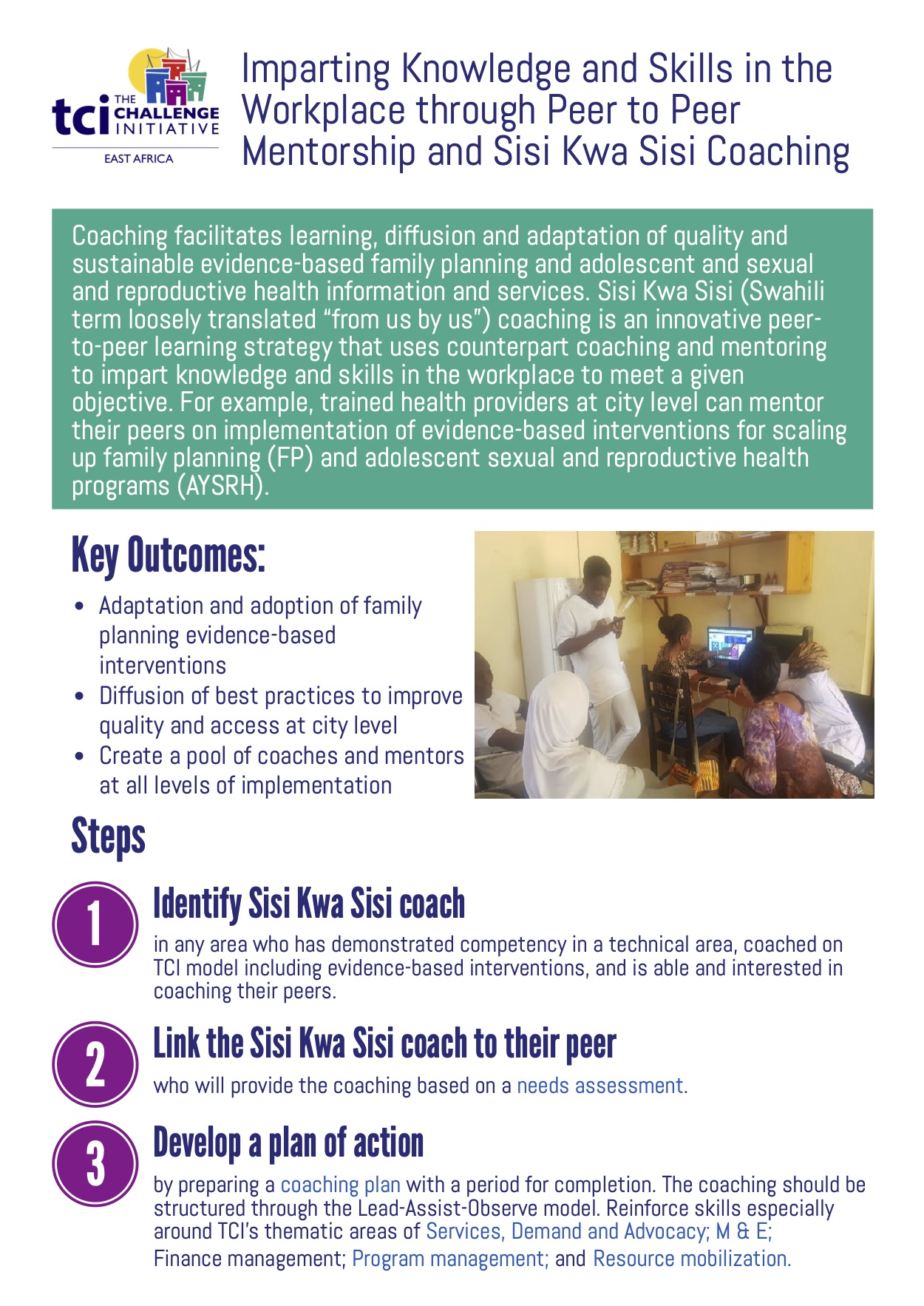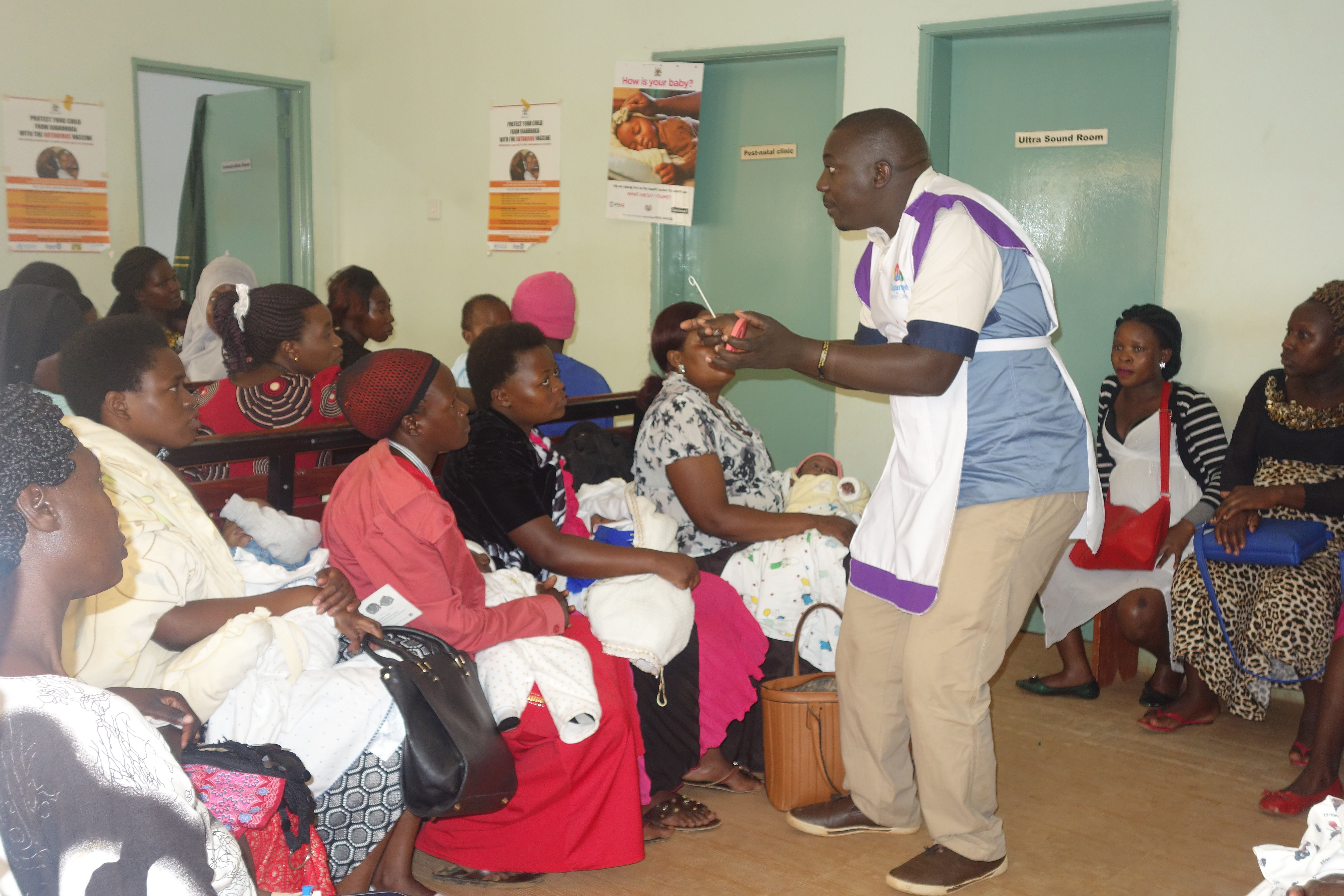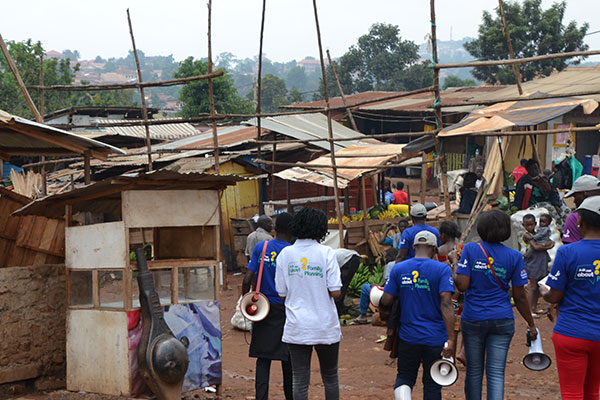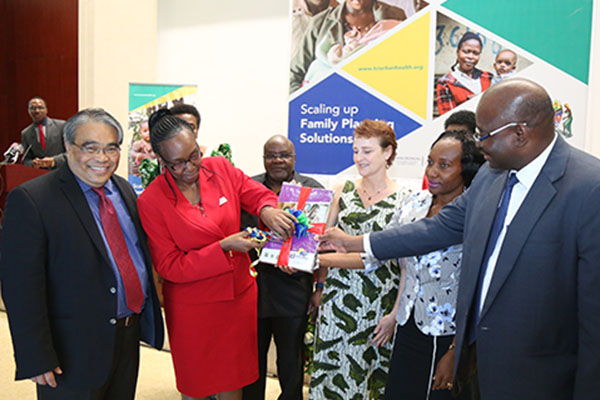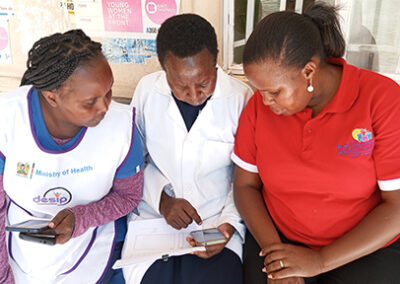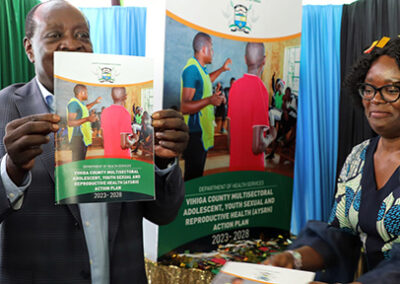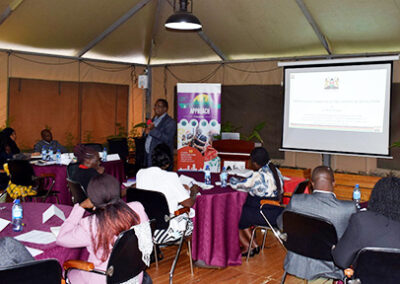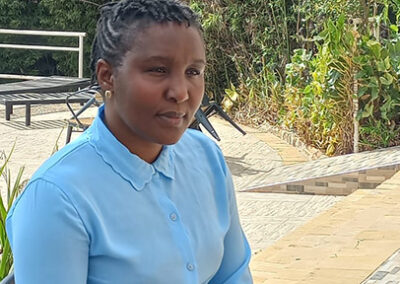East Africa Toolkit: Essentials
- Home
- Help and Support
- Close
- Toolkits
- Global Toolkit
- AYSRH Toolkit
- Hub Toolkits
- Core High-Impact Practices
- Gender Essentials Mini Course
- Close
- Resource Collection
- Community of Practice
- Coaching
- Log In/Register
- My Profile
- English
Sisi Kwa Sisi Coaching
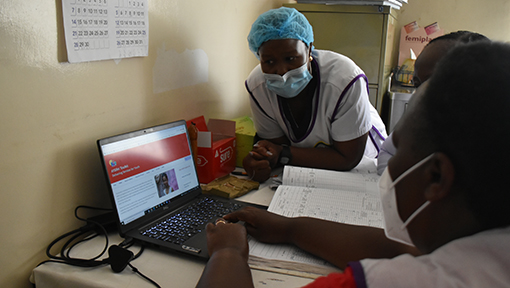 Sisi Kwa Sisi (Swahili term loosely translated “from us by us”) coaching is an innovative peer-to-peer learning strategy that uses counterpart coaching and mentoring to impart knowledge and skills in the workplace to meet a given objective. For example, trained health providers at city level can mentor their peers on implementation of evidence-based interventions for scaling up family planning (FP) and adolescent sexual and reproductive health programs (AYSRH).
Sisi Kwa Sisi (Swahili term loosely translated “from us by us”) coaching is an innovative peer-to-peer learning strategy that uses counterpart coaching and mentoring to impart knowledge and skills in the workplace to meet a given objective. For example, trained health providers at city level can mentor their peers on implementation of evidence-based interventions for scaling up family planning (FP) and adolescent sexual and reproductive health programs (AYSRH).
There are various levels of Sisi Kwa Sisi coaching within Tupange Pamoja:
- Global level staff engagement with hub staff to share global practices/trends for better family planning programming
- Hub level staff coaching country/city managers will focus more on various aspects of health systems strengthening (technical and managerial) through the evidence-based approaches for ownership, efficiency and resource allocation
- City level paired coaching engagement with master coaches/implementers to enhance knowledge transfer on implementation of quality evidence-based reproductive health management and interventions. This includes development of policies and guidelines, advocacy for resources, supportive supervision and stakeholder engagement, etc.
- Facility level – city level master coaches to facility staff/community health units involves coaching on FP/AYSRH high impact interventions as per the TCI-U toolkit for the purposes of improving access and quality of FP/AYSRH interventions
Why Is Sisi Kwa Sisi Coaching Important?
- Most people learn better from those they easily relate with, making transference of knowledge more effective. The process is structured yet flexible, incorporating specific complexities of the challenge at hand.
- Coaching facilitates learning, diffusion and adaptation of quality and sustainable evidence-based family planning and adolescent and sexual and reproductive health information and services.
Guidance: How to Implement Sisi Kwa Sisi Coaching
- Identify Sisi Kwa Sisi coach in any area who:
-
- Has demonstrated competency in a technical area
- Coached on TCI model including evidence-based interventions
- Able and interested in coaching their peers
Tip: Use the Guide for identifying coaches.
- Based on needs assessment, link the Sisi Kwa Sisi coach to their peer who will provide the coaching:
| Category | Roles & Responsibilities |
|---|---|
| Hub Staff |
|
| Country/City Manager |
|
| Program Implementation Team/City Reproductive Health Coordinator |
|
- Develop a plan of action by preparing a coaching plan with a period for completion. The coaching should be structured through the Lead-Assist-Observe model. Reinforce on skills especially around the following thematic areas
- Once the coaching has been done, ensure implementation of the action plan and follow up. Regularly monitor the action plan to see whether the coaching sessions are occurring and assess the quality.
- Document best practices and learnings that need to be cross-pollinated.
Helpful Tips
- Assign at least one person in your program or organization to manage the coaching sessions at the city level.
- Train a pool of implementers to be able to reach more health providers through Sisi Kwa Sisi coaching.
- Schedule follow-up meetings (in-person, if possible), and provide additional details as needed.
- Ensure coaching sessions align with relevant work plans and strategic priorities.
- When staff members have other responsibilities, it can be difficult to make time for coaching sessions. Consider assigning this task to someone on the team or include the coaching reviews during program implementation meetings or quarterly review meeting.
Key Outcomes
- Adaptation and adoption of family planning evidence-based interventions
- Diffusion of best practices to improve quality and access at city level
- Create a pool of coaches and mentors at all levels of implementation
Monitoring Processes
- Number of coaching sessions conducted
- Number of Sisi Kwa Sisi coaches developed
- Quality of coaching – monitor regularly via the coaching assessment tool for quality assurance
Success Indicators
- Number of cities adopting TCI’s coaching model
- Quality implementation of high impact interventions
Cost Elements
- Coaching material and resources for learning
- Facilitation costs such as transport and lunches for master coaches
Sustainability
- Incorporate the coaching approach in geography annual work plans
- Integrate the coaching concept into the usual facility updates such as continuous medical education programs and quality improvement programs
TCI APP USERS PLEASE NOTE
You will only receive CERTIFICATES by email – when earning a score above 80% – and will not be able to view or print a certificate PDF from the TCI app.
Test Your Knowledge
Earn a Certificate
Quiz Summary
0 of 5 Questions completed
Questions:
Information
You have already completed the quiz before. Hence you can not start it again.
Quiz is loading…
You must sign in or sign up to start the quiz.
You must first complete the following:
Results
Results
0 of 5 Questions answered correctly
Your time:
Time has elapsed
You have reached 0 of 0 point(s), (0)
Earned Point(s): 0 of 0, (0)
0 Essay(s) Pending (Possible Point(s): 0)
Categories
- Not categorized 0%
- 1
- 2
- 3
- 4
- 5
- Current
- Review
- Answered
- Correct
- Incorrect
-
Question 1 of 5
1. Question
The various levels of Sisi Kwa Sisi coaching include:
CorrectIncorrect -
Question 2 of 5
2. Question
Sisi Kwa Sisi coaching is effective because people learn better from people they relate to.
CorrectIncorrect -
Question 3 of 5
3. Question
Responsibilities of a hub staff in the coaching process includes:
CorrectIncorrect -
Question 4 of 5
4. Question
How useful did you find the information and/or tools presented on this page? Please write your response in the box below using one of the following phrases: Very useful, Useful, Somewhat useful, Not useful.
Feel free to comment on why you made that choice.
-
This response will be awarded full points automatically, but it can be reviewed and adjusted after submission.
Grading can be reviewed and adjusted.Grading can be reviewed and adjusted. -
-
Question 5 of 5
5. Question
How do you intend to use the information reviewed and/or tools that you accessed?
-
This response will be awarded full points automatically, but it can be reviewed and adjusted after submission.
Grading can be reviewed and adjusted.Grading can be reviewed and adjusted. -


